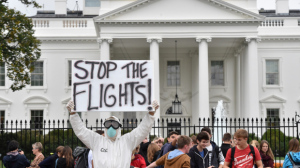NAIROBI, Kenya (AP) — Health officials battling the Ebola outbreak that has killed more than 4,500 people in West Africa have managed to limit its spread on the continent to five countries – and two of them appear to have snuffed out the disease.
The developments constitute a modest success in an otherwise bleak situation.
Officials credit tighter border controls, good patient-tracking and other medical practices, and just plain luck with keeping Ebola confined mostly to Liberia, Sierra Leone and Guinea since the outbreak was first identified nearly seven months ago.
Senegal did so well in finding and isolating a man with Ebola who had slipped across the border from Guinea in August that the World Health Organization on Friday will declare the end of the disease in Senegal if no new cases surface.
Nigeria is another success story. It had 20 cases and eight deaths after the virus was brought by a Liberian-American who flew from Liberia to Lagos, Nigeria’s commercial capital of 21 million people, in July. Nearly 900 people were potentially exposed to the virus by the traveler, who died, and the disease could have wreaked havoc in Africa’s most populous nation.
Instead, Ebola appears to have been beaten, in large part through aggressive tracking of Ebola contacts, with no new cases since Aug. 31.
WHO, the U.N. health agency, called it “a piece of world-class epidemiological detective work.” The organization is set to declare an end to the outbreak in Nigeria on Monday.
Nigeria had a head start compared with other West African countries: Officials were able to use an emergency command center that had been built by the Bill and Melinda Gates Foundation to combat polio.
Border closings may also be helping halt the spread of Ebola.
Ivory Coast, Guinea-Bissau and Senegal, all of which share borders with at least one of the three most affected countries, have closed those borders.
The disease continues to ravage Liberia, Guinea and Sierra Leone, overwhelming their health systems.
And some observers warn that border closings can have limited effect in a region with highly porous boundaries and few resources to patrol them. Border posts are sometimes easily skirted.
There is also concern that travel restrictions will make things worse in the affected countries by creating what amounts to an economic embargo.
“We have been isolated,” said Kaifala Marah, Sierra Leone’s finance and economic development minister. “It really is killing our economies.”
Authorities in some African countries imposed tight air travel restrictions, tougher than those contemplated by the U.S. or British governments.
South Africa and Zambia slapped travel and entry restrictions on Ebola-stricken countries. Kenya Airways, the country’s main airline, stopped flying to the affected lands.
In Zimbabwe, all travelers from West Africa are put under 21-day surveillance. Health officials regularly visit those travelers to check their condition.
Nigeria initially banned flights from countries with Ebola but relaxed the restriction once it felt that airlines were competent to take travelers’ temperatures and follow other measures to prevent people with Ebola from flying.
Nigeria has teams taking the temperature of travelers at airports and seaports.
In Ethiopia, the main international airport in Addis Ababa screens all arriving passengers – including those from Europe and the U.S. – for fever using body scans.
South Africa has tested 14 people for Ebola, all of whom proved negative.
“To tell you the truth, we were testing them just to settle your nerves,” Aaron Motsoaledi, South Africa’s health minister, told reporters. “Clinically speaking, most of them did not fit criteria for testing.”
Another factor is luck. All it takes is one infected person to slip around guards at a border post or get aboard a plane.
“God has been merciful we haven’t reported a case in Kenya, but we really need to up our disaster preparedness,” said Dr. Nelly Bosire, an official with Kenya’s main medical union.
“The fact we stopped doing the West African flights had an impact. On that part I think we got it right. But it still has more to do with luck.









